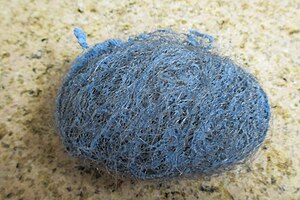Stainless steel soap
| Against allopathy Alternative medicine |
| Clinically unproven |
| Woo-meisters |
Stainless steel soap is just that: the use of a slab of stainless steel for cleansing purposes — although it isn't very soapy.
Chunks of polished stainless steel have been sold for this purpose; a German firm holds a 2004 patent for its version.[1]
That it doesn't actually work at all is, of course, no barrier to its adoption.
Theory
The underlying idea is that the iron or chromium in the stainless steel soap binds sulfur compounds that cause the strong odors of garlic, onions, and other food items. This chemical binding does occur with many catalysts in much more forcing conditions, but there's no proof that it happens in kitchen sink conditions.
It seems likelier that any effects from the stainless steel soap are actually due to the actions of running water and friction, and that a chunk of rubber, plastic, or something similarly solid would yield comparable results.
Currently, the product does not seem to have been tested with any rigor, but an anecdotal report from a chemistry professor is negative, as are most reports from professional news outlets.
Comparison with actual soap
Traditional soap has the detergent![]() quality that arises from its combination of organic acids with inorganic ions, resulting in a product that allows normally insoluble oil and grease to emulsify more easily with water. Stainless steel soap lacks these detergent properties.
quality that arises from its combination of organic acids with inorganic ions, resulting in a product that allows normally insoluble oil and grease to emulsify more easily with water. Stainless steel soap lacks these detergent properties.
Advantages
- Stainless steel soap does not melt or dissolve in water nearly as quickly as conventional soaps. It's probably safe to say that one bar will last a lifetime.
- If you've ever run out of dishwasher soap and attempted to run the dishwasher using ordinary dish or household soap, you know what a mess that can make. Stainless steel soap does not cause this problem.[notes 1]
- If it happens to slip down the garbage disposal, you'll know instantly.
- Endorsed by the Stainless Steel Rat.

- Can be used to defend oneself if ever attacked in the shower — though this might count as use of deadly
cleaning productweapon. - The "soap on a
chainrope" version doubles as a medieval weapon. - If your house ever gets hit by a jet airliner, rest assured that the government is lying if they report failing to recover your steel soap unharmed (since jet fuel can't melt steel soaps).
- If lost, can be found with metal detectors.
- Vegan friendly, maan!
- Can be made out of recycled materials.
- Holds an edge better than most other brands of soap; perfect for making a shank if you're in prison. Assuming you can sharpen it — if not, just dumping the bar into a sock and spinning it is likely the way to go.
- It works very good as a paperweight.
- No risk of soap drop, because it's not the least bit slippery — even in water.
- It won't leave behind gunky soap scum.
- You can be sure your roommate wouldn't use the stainless steel soap to jerk off.
- You can play the "cold stethoscope on someone's skin" as a prank.
- Definitely cooler than the typical soap bar.
- Great for squashing annoying fairies
Disadvantages
- It doesn't work.
- Liquid form irritates skin badly. (It also makes skin disappear.)[notes 2]
- Not recommended for soap carving (unless you
are on aciduse acid ).
). - Will hurt if you drop it on your toes.
- Can't be used to make soap bubbles.
- Not organic.
- Poor lubricant.
- Doesn't really make suds all that well below 1370°C (2500°F).
- If you catch your kids using their pottymouth, they might need their mouths cleaned with soap and water — just remember that, if using this soap to do it, your children will also need dentures.
- Probably not a good idea to place in a microwave.
- If you throw away a bar in anger you will probably break something or even hurt someone.
- Iron and steel are generally not recommended for the wee folk.
External links
- Does a Bit of Steel Get Rid of That Garlic Smell, NPR
- What is Stainless Steel Soap, wiseGEEK
- Stainless steel soap, New York Times.
- Stainless steel soap, Australian ABC, audio.
Notes
References
- ↑ How Does Stainless Steel Remove Odors? About.com, 2009.

